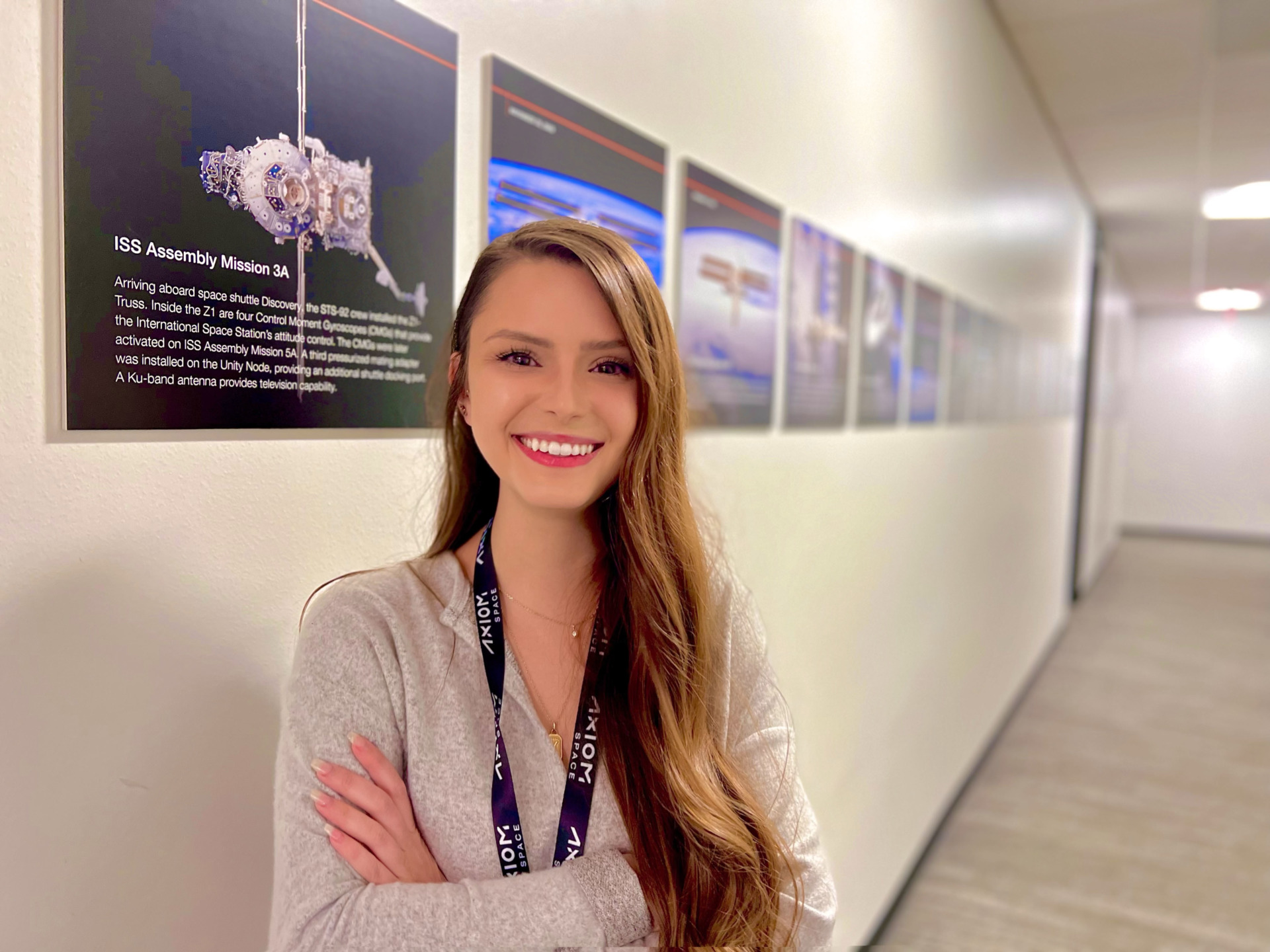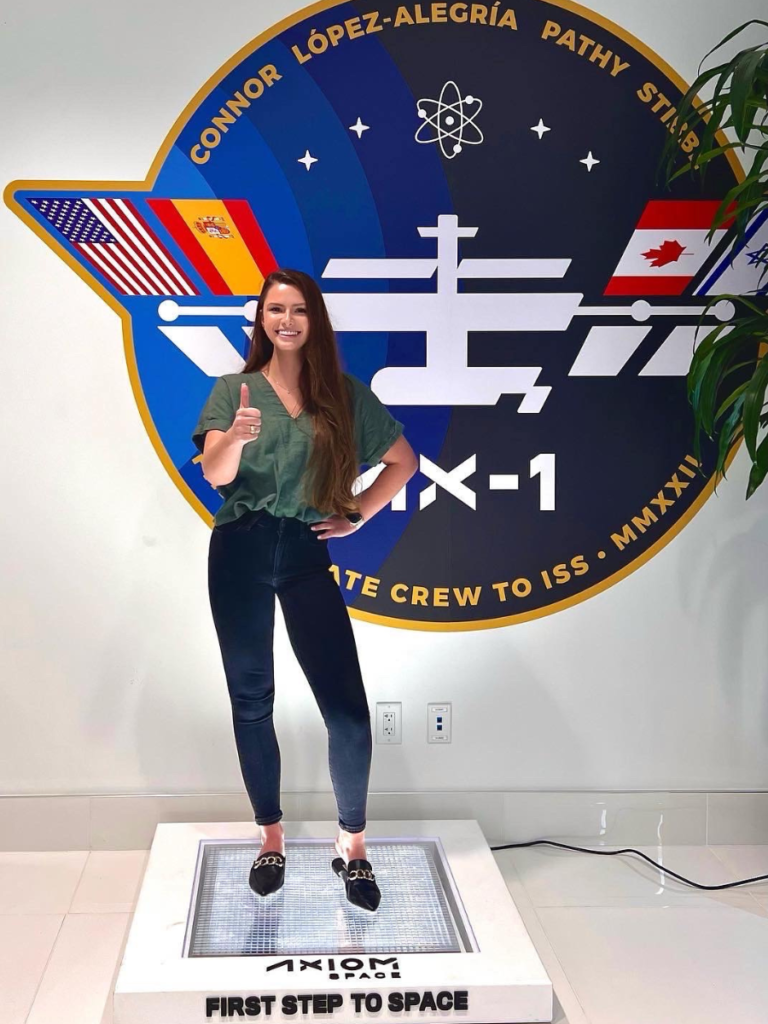Food science and technology student connects to aerospace industry
Department faculty continue to help Kendall Howie ’19 achieve further academic, career goals
Coming from a family of “professional students” as she likes to call them, Kendall Howie ’19 knew from an early age that getting an advanced degree was likely a path she would take in life.

As many students do while in high school, the Dallas native toured numerous universities trying to find the right fit. After multiple schools where the tours and visits felt routine and rehearsed, Howie found herself at Texas A&M University.
“I was not having the same conversations that I had during my other visits, and I felt that the people I met with genuinely had an interest in my future successes,” said Howie. “At the end of the day, Texas A&M was the only university that made me feel like more than a number or a name on their list of enrollments.”
The people made the difference for her, and the people in the College of Agriculture and Life Sciences’ Department of Food Science and Technology continue to be the difference as she works toward earning her doctorate in December while working full time in the aerospace industry.
Why did you choose food science and technology?
When I first came to the university I was pursuing a degree in microbiology, but found that my interest in the subject faded quickly. During the second half of my freshman year, I found myself struggling to find my passion for the subject that was once so strong.
That prompted me to register for several life science electives, one of which happened to be Introduction to Food Science. My interest was immediately piqued, and this was reinforced when I learned that I could pursue, and possibly even revive, my passion for microbiology by shifting my focus toward food microbiology and safety.
Did your upbringing have any bearing on your decision to pursue a food science career?
I was raised by several individuals, who I call professional students – a grandfather with a doctorate in chemistry, an aunt with a doctorate in toxicology and a father with a Juris Doctorate. I was also fortunate to grow up with a mother who is a designer, an artist and a creator.
My upbringing contributed to the development of the characteristics that drew me to not only pursue a degree in food science and technology, or even to pursue an advanced degree in the same field, but also to approach my research with balance. This means a balance between being analytical and being creative; being methodical but flexible; pursuing my goals intentionally and fiercely; and also giving myself time to dream and find creative outlets.
What was your favorite food science and technology class?
Preventive Controls for Human Food, taught by Gary Acuff, Ph.D., professor emeritus and Texas A&M AgriLife Research Faculty Fellow.
The class utilized real-world applications to focus on the procedures involved with conducting an analysis of the hazards that may exist within a food manufacturing facility and production line, and the methods by which these identified hazards can be mitigated. In my career, I find myself utilizing this knowledge every day. This course also allowed students to obtain their Preventive Controls Qualified Individual certification, a designation that has allowed me to stand out within the industry.
What do you plan to do after you graduate?

I currently work for Axiom Space, a privately funded space infrastructure developer, as a food scientist. After I graduate, I plan to continue my career in the aerospace industry. My current role is incredibly rewarding, and I look forward to being able to expand on that.
I have had the opportunity to lead efforts in providing inflight food service for private astronaut missions and assist with making strides toward sustained deep space exploration. I have always said that my dream job is one where every day is different, that allows me to make a meaningful impact on our world, and that is unique when compared to other roles within the food science industry. This almost exactly describes my current role with Axiom, so one can say that I have my dream job.
What is it like working full time while also pursuing your doctorate?
I graduated with my bachelor’s degree in December 2019 and started my doctorate immediately in January 2020. I started with Axiom in June 2022 as a consultant, and after three months, they offered me a full-time position. Their headquarters is in Houston, and I live in Dallas. I also travel to College Station as needed for presentations and research endeavors but work remotely from home when I can.
Working a full-time job while simultaneously pursuing an advanced degree is quite the challenge. I have recently finished my preliminary exams and found that my biggest struggle was finding the balance of study time and work time. Unfortunately, this meant that I had to sacrifice weekends for a few months and meant that I was not able to support the typical “month-straight of doing nothing but studying” like other doctoral students often do.
However, with challenges also come immense excitement. Being a “space food scientist” is exciting in and of itself, but having the opportunity to grow as an academic and as a working professional simultaneously is one of the most thrilling things I have ever done.
Working while going to school has provided me with the opportunity to put the knowledge gained in pursuit of my degrees to use in a dynamic environment, while also utilizing the confidence and experiences gained as a result of this environment toward my academic endeavors.
What is your research focus?
My graduate research focuses on fully cooked, prepared meals and how they respond to electron beam, eBeam, processing.
The goal of this research is to understand how exposure of meals to eBeam ionizing energy affects their shelf life and long-term quality to pinpoint the upper dose limit to which the meals can be subjected. This will help develop shelf-stable meals for use in the airline and commercial space travel catering industries.
The scope of this study can be applied to disaster rations, hospital meals and meal delivery kits. It also functions to address the high degree of food waste within these industries due to the relatively short shelf life of these meals.
How do you feel your time as a food science and technology student has shaped your career path?
My time as a student has almost exclusively shaped my career path, especially when considering my research focus and time working with the National Center for Electron Beam Research, NCEBR, a world leader in electron beam technology.
My experience working with the NCEBR allowed me to make the initial connection with my current employer because of their interest in space food. Then, the knowledge gained in pursuit of my dissertation has allowed me to be successful in the role that I was offered because of this connection.
Do you have a favorite memory of your time as a food science student?
I always think fondly of the time surrounding the last semester of my undergraduate career. I was fortunate not to have a large course load and, as a result, was able to spend most of my time working in two food science and technology research labs.
I worked in the Cereal Quality Lab, managed by Joseph Awika, Ph.D., professor and head of the department, in the summer of 2019, where I was able to experience in-lab research efforts for the first time. This experience heightened my interest in research and prompted me to seek out additional opportunities during the fall 2019 semester.
That is where I made the initial connection with my committee chair, Suresh Pillai, Ph.D., professor and associate department head, who allowed me to pursue my love for food microbiology in a hands-on manner within his lab. Overall, this time was not only incredibly enjoyable but also instrumental in my decision to pursue a graduate degree and conduct my own research.
What makes the Department of Food Science and Technology special?
The people. I have had several incredible mentors throughout my time here. I was fortunate to make a connection with Rebecca Creasy, Ph.D., instructional assistant professor, during my first semester as a food science and technology student in 2016, when she was my instructor. She has since helped guide me through both personal and academic struggles.
During the spring of 2018, I met Steve Talcott, Ph.D., professor, when I took his Food Chemistry course, and he has not ceased in supporting me since.
Finally, there are simply no words to accurately describe how instrumental my committee chair, Dr. Pillai, has been in my success as a graduate student and as a working professional. It is truly a special thing to have not one, but three faculty members seemingly willing to do anything to shape you into the best version of yourself and to help you succeed.
Virtually all the faculty members within the department have made a significant impact on me as a student, a researcher or a person at some point. Only at Texas A&M is it easy to find such approachable mentors who are completely dedicated to the successes of their students. And that is why I believe the Department of Food Science and Technology is truly special.


